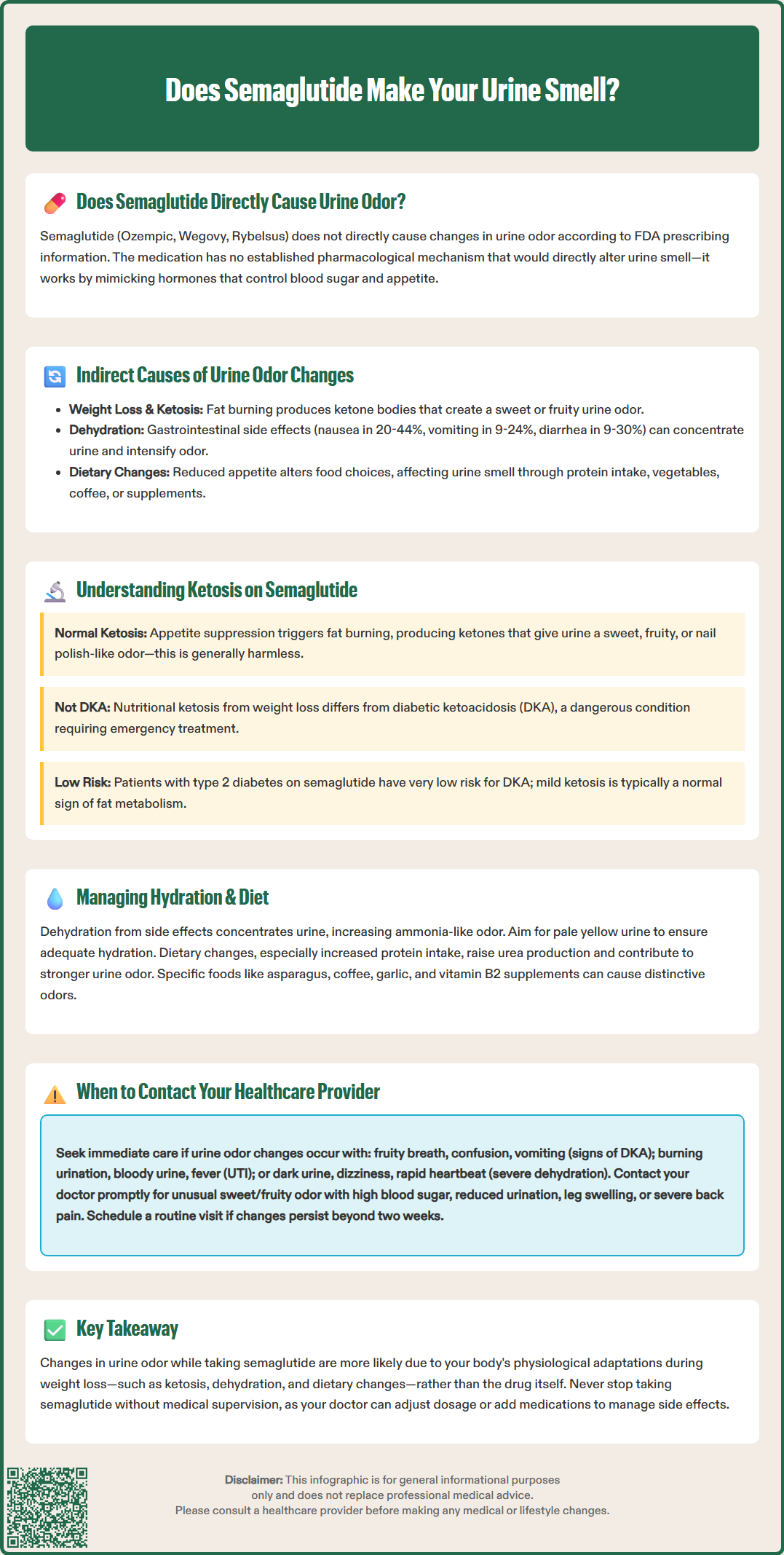LOSE WEIGHT WITH MEDICAL SUPPORT — BUILT FOR MEN
- Your personalised programme is built around medical care, not willpower.
- No generic diets. No guesswork.
- Just science-backed results and expert support.
Find out if you’re eligible

Does semaglutide make your urine smell? While changes in urine odor are not listed as a direct side effect of semaglutide (Ozempic, Wegovy, Rybelsus), some patients report noticing differences during treatment. This GLP-1 receptor agonist, FDA-approved for type 2 diabetes and weight management, does not chemically alter urine through its primary mechanism. However, the metabolic changes accompanying weight loss—including ketosis, dietary modifications, and dehydration from gastrointestinal side effects—can indirectly affect urine characteristics. Understanding these secondary effects helps distinguish normal physiological adaptations from symptoms requiring medical attention. This article examines why urine odor may change during semaglutide therapy and when to consult your healthcare provider.
Quick Answer: Semaglutide does not directly cause urine odor changes, but the metabolic effects of weight loss, ketosis, dehydration, and dietary modifications during treatment can indirectly alter urine smell.
Semaglutide, marketed as Ozempic, Wegovy, and Rybelsus, is a glucagon-like peptide-1 (GLP-1) receptor agonist approved by the FDA for type 2 diabetes management and chronic weight management. According to the FDA prescribing information for these medications, changes in urine odor are not listed as a direct adverse effect of semaglutide, though some patients have anecdotally reported noticing differences in their urine smell during treatment.
There is no established pharmacological mechanism by which semaglutide itself would directly alter urine odor. The medication works by mimicking the incretin hormone GLP-1, which enhances glucose-dependent insulin secretion, suppresses glucagon release, slows gastric emptying, and reduces appetite through central nervous system pathways.
However, the indirect effects of semaglutide treatment—particularly significant weight loss, dietary modifications, and metabolic changes—can lead to alterations in urine characteristics. Additionally, the medication's gastrointestinal side effects may lead to dehydration, which can concentrate urine and affect its odor. In rare cases, severe gastrointestinal symptoms may contribute to acute kidney injury, as noted in FDA labeling, which could potentially affect urine composition.
Understanding the distinction between direct drug effects and secondary metabolic consequences is important for both patients and clinicians. If you notice changes in urine odor while taking semaglutide, it is more likely related to the physiological adaptations your body undergoes during weight loss rather than a direct chemical effect of the medication itself. This article examines the common reasons why urine odor may change during semaglutide therapy and provides guidance on when such changes warrant medical attention.
Several interconnected factors associated with semaglutide therapy can contribute to changes in urine odor, though none are caused directly by the medication's molecular structure or primary mechanism of action. The most common explanations relate to the metabolic and behavioral changes that accompany effective weight loss treatment.
Metabolic shifts during weight loss represent the primary reason for urine odor changes. As patients lose weight—with clinical trials showing approximately 15% mean weight loss with Wegovy 2.4 mg plus lifestyle intervention, and somewhat lower averages with diabetes doses of Ozempic—the body mobilizes fat stores for energy. This process produces ketone bodies (acetoacetate, beta-hydroxybutyrate, and acetone), which are partially excreted in urine and can impart a distinctive sweet or fruity odor. This is a normal physiological response to caloric deficit and increased fat metabolism.
Dietary modifications commonly occur with semaglutide treatment, both due to the medication's appetite-suppressing effects and patients' intentional efforts to maximize weight loss. Changes in protein intake, consumption of certain vegetables (particularly asparagus, which contains asparagusic acid), increased coffee intake, or vitamin supplementation can all affect urine odor. The medication's effect on gastric emptying may influence the absorption of certain oral medications, though significant nutrient malabsorption is not a labeled effect.
Concentration of urine due to reduced fluid intake is another factor. Semaglutide's gastrointestinal effects vary by product and dose: nausea (20-44%), vomiting (9-24%), and diarrhea (9-30%) according to FDA prescribing information. These side effects may lead some individuals to drink less fluid. More concentrated urine naturally has a stronger odor due to higher concentrations of urea, ammonia, and other waste products.

Ketosis is one of the most frequent causes of altered urine odor in patients experiencing significant weight loss on semaglutide. When caloric intake is substantially reduced—a common occurrence given semaglutide's potent effects on appetite and satiety—the body shifts from primarily using glucose for energy to breaking down stored fat. This metabolic state produces ketone bodies as byproducts of fat oxidation.
The three ketone bodies produced during fat metabolism are acetoacetate, beta-hydroxybutyrate, and acetone. Acetoacetate and beta-hydroxybutyrate are excreted through the kidneys into urine, while acetone is primarily eliminated through respiration (causing characteristic "fruity" breath). When present in urine, these ketones can create a sweet, fruity, or sometimes described as "nail polish remover" odor. This is distinct from diabetic ketoacidosis (DKA), a dangerous condition that occurs primarily in type 1 diabetes or severe insulin deficiency.
Nutritional ketosis versus pathological ketoacidosis is an important distinction. The mild ketosis associated with weight loss on semaglutide is generally benign and indicates effective fat metabolism. In contrast, DKA involves extremely high ketone levels, severe hyperglycemia, and metabolic acidosis requiring emergency treatment. Patients with type 2 diabetes on semaglutide are at very low risk for DKA, though rare case reports exist, particularly in the context of significant insulin dose reductions.
According to American Diabetes Association guidance, people with diabetes should check ketones during illness, with persistent hyperglycemia, or if symptomatic. For most patients, mild ketosis during weight loss is not concerning and may even be viewed as a marker of metabolic adaptation. However, if accompanied by excessive thirst, frequent urination, confusion, abdominal pain, or difficulty breathing, immediate medical evaluation is necessary to rule out more serious metabolic disturbances.
Dehydration is a frequently overlooked contributor to changes in urine odor among patients taking semaglutide. The medication's common gastrointestinal adverse effects—including nausea, vomiting, and diarrhea as documented in FDA prescribing information—can reduce fluid intake and increase fluid losses. When the body becomes even mildly dehydrated, urine becomes more concentrated, intensifying its natural odor and color.
Concentrated urine contains higher levels of urea, creatinine, and other nitrogenous waste products. As water content decreases, the relative concentration of these compounds increases, producing a stronger ammonia-like smell. Additionally, dehydration reduces the kidney's ability to dilute waste products effectively, further contributing to odor intensity. Patients should aim for adequate hydration, with a practical goal of maintaining pale yellow urine. Hydration needs vary by individual, activity level, and medical conditions (those with heart failure or kidney disease may need specific guidance from their healthcare provider).
Dietary changes accompanying semaglutide therapy significantly influence urine characteristics. Many patients naturally reduce carbohydrate intake and increase protein consumption while on the medication. Higher protein diets increase urea production, a nitrogen-containing compound that contributes to urine odor. Certain foods are particularly notorious for affecting urine smell:
Asparagus contains asparagusic acid, which breaks down into sulfur-containing compounds
Coffee and caffeinated beverages can impart a distinctive odor and have mild diuretic effects
Garlic and onions contain sulfur compounds that are excreted in urine
Riboflavin (vitamin B2) supplements can cause bright yellow urine
Patients should be aware that severe gastrointestinal symptoms can lead to acute kidney injury, as noted in FDA warnings. Signs of concern include markedly reduced urine output, swelling, or persistent vomiting/diarrhea. Maintaining a balanced diet and adequate hydration is important to minimize these effects while ensuring nutritional adequacy during weight loss.
While mild changes in urine odor are generally benign during semaglutide treatment, certain signs and symptoms warrant prompt medical evaluation. Understanding when urine changes indicate a potentially serious condition is essential for patient safety.
Immediate medical attention is required if urine odor changes are accompanied by:
Signs of diabetic ketoacidosis: excessive thirst, frequent urination, nausea, vomiting, abdominal pain, confusion, fruity-smelling breath, or rapid breathing. Though rare with semaglutide, DKA requires emergency treatment.
Symptoms of urinary tract infection (UTI): cloudy or bloody urine, burning during urination, pelvic pain, fever, or urgency. UTIs are not caused by semaglutide but require antibiotic treatment.
Severe dehydration indicators: dark amber or brown urine, dizziness, decreased urination, dry mouth, rapid heartbeat, or confusion.
Unusual sweet or fruity odor with hyperglycemia: particularly in patients with diabetes who notice elevated blood glucose readings.
Signs of kidney problems: markedly decreased urine output, swelling in legs or feet, persistent vomiting or diarrhea, or severe flank/back pain (possible kidney stones).
Routine consultation is appropriate for persistent changes in urine odor lasting more than two weeks, especially if accompanied by unexplained weight loss beyond expected parameters, persistent nausea affecting hydration, or concerns about nutritional adequacy. Your healthcare provider may recommend urinalysis to rule out infection, assess hydration status, and check for ketones or glucose.
Patients should maintain open communication with their prescribing physician throughout semaglutide therapy. Dose adjustments, additional antiemetic medications, or dietary counseling may help manage side effects contributing to urine changes. Laboratory monitoring, including renal function tests, may be recommended by your healthcare provider based on your individual risk factors and symptoms. Never discontinue semaglutide without medical guidance, as abrupt cessation may affect glycemic control in patients with diabetes.
No, semaglutide does not directly alter urine odor through its pharmacological mechanism. However, the metabolic changes from weight loss, including ketosis and dietary modifications, can indirectly affect urine smell.
A mild sweet or fruity odor typically indicates nutritional ketosis from fat metabolism during weight loss, which is generally benign. However, if accompanied by excessive thirst, confusion, abdominal pain, or rapid breathing, seek immediate medical attention to rule out diabetic ketoacidosis.
Maintain adequate hydration by drinking enough fluids to keep urine pale yellow, manage gastrointestinal side effects that may reduce fluid intake, and be aware that certain foods like asparagus and high-protein diets can naturally affect urine odor.
All medical content on this blog is created using reputable, evidence-based sources and is regularly reviewed for accuracy and relevance. While we strive to keep our content current with the latest research and clinical guidelines, it is intended for general informational purposes only.
This content is not a substitute for professional medical advice, diagnosis, or treatment. Always consult a licensed healthcare provider with any medical questions or concerns. Use of this information is at your own risk, and we are not liable for any outcomes resulting from its use.